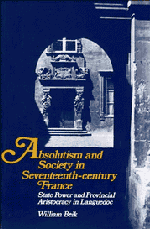 Absolutism and Society in Seventeenth-Century France
Absolutism and Society in Seventeenth-Century France Book contents
- Frontmatter
- Contents
- List of tables
- List of figures
- Preface
- List of abbreviations
- Map: Languedoc in the seventeenth century
- PART ONE INTRODUCTION
- PART TWO THE DISTRIBUTION OF AUTHORITY
- PART THREE THE PROVINCE ON ITS OWN
- PART FOUR THE PROVINCE AND THE CROWN
- Conclusion
- Appendix: Breakdown of taxes from the diocese of Toulouse, 1677
- Select bibliography
- Index
Appendix: Breakdown of taxes from the diocese of Toulouse, 1677
Published online by Cambridge University Press: 05 July 2011
- Frontmatter
- Contents
- List of tables
- List of figures
- Preface
- List of abbreviations
- Map: Languedoc in the seventeenth century
- PART ONE INTRODUCTION
- PART TWO THE DISTRIBUTION OF AUTHORITY
- PART THREE THE PROVINCE ON ITS OWN
- PART FOUR THE PROVINCE AND THE CROWN
- Conclusion
- Appendix: Breakdown of taxes from the diocese of Toulouse, 1677
- Select bibliography
- Index
Summary
The social distribution of taxes discussed in chapter 11 is based on an analysis of the accounts of the diocese of Toulouse. Other dioceses would have similar articles with variations for the local items.
Table 14 shows the articles as they were listed in the account, with appropriate explanation. Of the total 317,995 livres imposed, 293,516 livres (92.3 percent) were provincial taxes, while 24,479 livres (7.7 percent) were added on by the diocese in the form of fees or local expenses. If we start with the sums added by the diocese, we can see from table 15 that most of them went directly into the pockets of the local notables. Some items did recompense local officers and notables for services rendered, but most of these services were only marginally useful, especially the 5,480 livres – almost 2 percent of the entire diocesan tax burden – which went for the banquets, refreshments, and stipends of the representatives who attended the annual assiette meeting.
What became of the ‘provincial’ funds?
1. The ‘traditional taille’ (aide, octroi, crue) was assigned by the crown to cover ‘ordinary’ expenses at the local level, notably the stipends of royal officers. The diocesan receivers themselves paid their own officers, the présidial and sénéchaussée judges, and certain functionaries of the universities of Toulouse and Montpellier.
- Type
- Chapter
- Information
- Absolutism and Society in Seventeenth-Century FranceState Power and Provincial Aristocracy in Languedoc, pp. 340 - 347Publisher: Cambridge University PressPrint publication year: 1985


